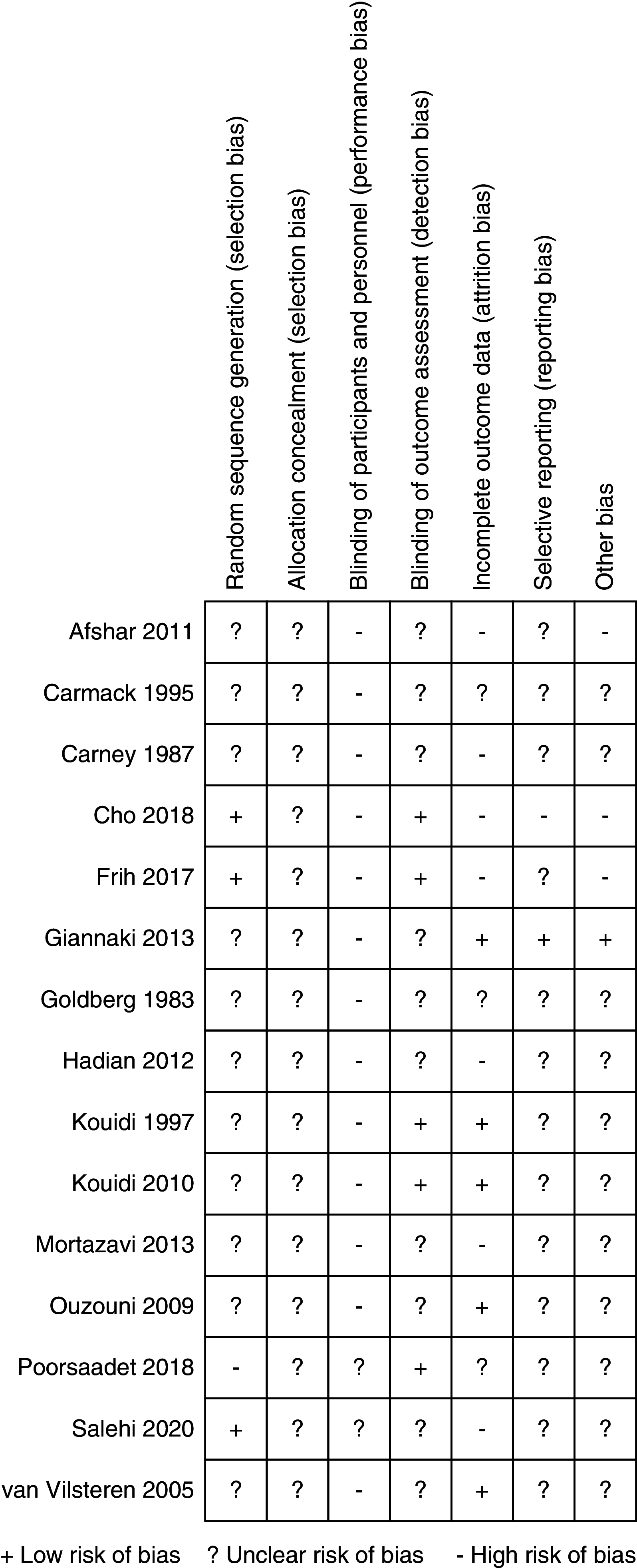Effect of Aerobic Exercise on Dialysis-Related Symptoms in Individuals Undergoing Maintenance Hemodialysis: A Systematic Review and Meta-Analysis of Clinical Trials
- PMID: 33766925
- PMCID: PMC8092056
- DOI: 10.2215/CJN.15080920
Effect of Aerobic Exercise on Dialysis-Related Symptoms in Individuals Undergoing Maintenance Hemodialysis: A Systematic Review and Meta-Analysis of Clinical Trials
Abstract
Background: Hemodialysis is associated with a high symptom burden that impairs health-related quality of life and functional status. Effective symptom management is a priority for individuals receiving hemodialysis. Aerobic exercise may be an effective, nonpharmacologic treatment for specific hemodialysis-related symptoms. This systematic review investigated the effect of aerobic exercise on hemodialysis-related symptoms in adults with kidney failure undergoing maintenance hemodialysis.
Design, setting, participants, & measurements: We searched MEDLINE, PubMed, Cochrane CENTRAL, CINAHL, PsycINFO, SPORTDiscus, EMBASE, PEDro, and Scopus databases from 1960 or inception until April 15, 2020 for randomized controlled trials investigating the effect of aerobic exercise on hemodialysis-related symptoms, identified as prespecified primary or secondary outcomes, as compared with controls in adults on maintenance hemodialysis. We identified restless legs syndrome as the primary outcome.
Results: Of 3048 studies identified, 15 randomized controlled trials met the eligibility criteria. These studies investigated the effect of aerobic exercise on restless legs syndrome (two studies), sleep disturbance (four studies), anxiety (four studies), depression (nine studies), muscle cramping (one study), and fatigue (one study). Exercise interventions were intradialytic in ten studies and outside of hemodialysis in five studies. Heterogenous interventions and outcomes and moderate to high risk of bias precluded meta-analysis for most symptoms. Aerobic exercise demonstrated improvement in symptoms of restless legs syndrome, muscle cramping, and fatigue, as compared with nonexercise controls. Meta-analysis of depressive symptoms in studies using the Beck Depression Inventory demonstrated a greater reduction in Beck Depression Inventory score with exercise as compared with control (mean difference -7.57; 95% confidence interval, -8.25 to -6.89).
Conclusions: Our review suggests that in adults on maintenance hemodialysis, aerobic exercise improves several hemodialysis-related symptoms, including restless legs syndrome, symptoms of depression, muscle cramping, and fatigue. However, the use of validated outcome measures with demonstrated reliability and responsiveness in more diverse hemodialysis populations is required to fully characterize the effect of this intervention.
Clinical trial registry name and registration number: PROSPERO #CRD42017056658.
Keywords: aerobic exercise; dialysis-related symptoms; fatigue; hemodialysis; quality of life; restless legs syndrome.
Copyright © 2021 by the American Society of Nephrology.
Figures





Comment in
-
The Promise and Challenge of Aerobic Exercise in People Undergoing Long-Term Hemodialysis.Clin J Am Soc Nephrol. 2021 Apr 7;16(4):505-507. doi: 10.2215/CJN.01960221. Epub 2021 Mar 25. Clin J Am Soc Nephrol. 2021. PMID: 33766926 Free PMC article. No abstract available.
References
-
- Almutary H, Bonner A, Douglas C: Symptom burden in chronic kidney disease: A review of recent literature. J Ren Care 39: 140–150, 2013 - PubMed
-
- Merkus MP, Jager KJ, Dekker FW, de Haan RJ, Boeschoten EW, Krediet RT: Physical symptoms and quality of life in patients on chronic dialysis: Results of The Netherlands Cooperative Study on Adequacy of Dialysis (NECOSAD). Nephrol Dial Transplant 14: 1163–1170, 1999 - PubMed
-
- Weisbord SD, Fried LF, Arnold RM, Fine MJ, Levenson DJ, Peterson RA, Switzer GE: Prevalence, severity, and importance of physical and emotional symptoms in chronic hemodialysis patients. J Am Soc Nephrol 16: 2487–2494, 2005 - PubMed
-
- Kimmel PL, Emont SL, Newmann JM, Danko H, Moss AH: ESRD patient quality of life: Symptoms, spiritual beliefs, psychosocial factors, and ethnicity. Am J Kidney Dis 42: 713–721, 2003 - PubMed
-
- Murtagh FEM, Addington-Hall J, Higginson IJ: The prevalence of symptoms in end-stage renal disease: A systematic review. Adv Chronic Kidney Dis 14: 82–99, 2007 - PubMed
Publication types
MeSH terms
LinkOut - more resources
Full Text Sources
Other Literature Sources
Medical
Miscellaneous

